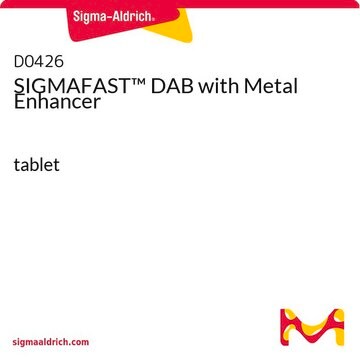DAB-M
IHC Select HRP/DAB, 150 Test
IHC Select HRP/DAB Tests for Immunocytochemistry, Immunohistochemistry & Immunohistochemistry (Paraffin).
Synonim(y):
HRP/DAB, immunoperoxidase secondary detection system
About This Item
Polecane produkty
reaktywność gatunkowa
mouse, rabbit
producent / nazwa handlowa
Chemicon®
IHC Select
metody
immunocytochemistry: suitable
immunohistochemistry (formalin-fixed, paraffin-embedded sections): suitable
metoda wykrywania
colorimetric
Warunki transportu
wet ice
Opis ogólny
Immunohistochemical techniques have been in use as adjunctive methods for the recognition of cells in tissue sections for at least 50 years. The first method reported use of fluorescent labels in 19421. In 1974, reports of using enzymatic labels, such as horseradish peroxidase (HRP) in routine H & E paraffin sections appeared2,3. The methods have since become the ′standard of care′ in surgical pathology when classic methods alone fail to yield a definitive diagnosis4-9.
Early techniques were based on the peroxidase-anti-peroxidase (PAP) reaction28, while improvements exploited the strong affinity of avidin for biotin10. This technique uses HRP-labeled streptavidin. The secondary antibody is conjugated with biotin and the streptavidin-HRP complex reacts with the biotin on the secondary antibodies. The resulting biotin-avidin-HRP complex can react with the primary antibody bound to the specific epitope of the target antigen. The HRP enzymes of the streptavidin complex then catalyze the substrate/chromogen reaction to form a colored reaction product (brown to black when using DAB as the chromogen) at the antigen site. A biological stain is then used to visualize the whole tissue section.
Zastosowanie
General Purpose Reagents
Opakowanie
Komponenty
*20782/15 mL - Secondary Antibodies: biotinylated goat anti-mouse IgG and goat anti-rabbit IgG in PBS, containing carrier protein
*20777/15 mL - Streptavidin HRP: Diluted in Tris Buffered Saline
*71895/2 mL - DAB Chromogen A: 3,3′ Diaminobenzidine diluted in TBS
*71896/2 x 15 mL - DAB Chromogen B: hydrogen peroxide diluted in TBS, containing Tween® 20
*20780/15 mL - Hematoxylin: Mayer′s hematoxylin counter stain
*20776/275 mL - 20X Rinse Buffer: TBS
Powiązanie
Przechowywanie i stabilność
When stored at 2 - 8°C, the IHC Select Immunoperoxidase Secondary Detection System is stable up to the expiration date printed on the kit label. Do not freeze or expose to elevated temperatures. Discard any remaining reagents after the expiration date. Do not store kit components or perform staining in strong light, such as direct sunlight.
Precautions:
- Pooling, substitution or alteration of any reagent may cause erroneous results.
- Do not mix reagents from different lots.
- Do not allow the slides to dry at any time during the staining procedure.
- Handle all specimens and materials coming in contact with them as potentially infectious materials. Disinfect with 0.05% sodium hypochlorite.
- Do not mouth pipette reagents. If ingested, seek professional assistance or contact a Poison Control Center immediately.
- Diaminobenzidine (DAB) may be carcinogenic. This solution may cause irritation upon skin contact. Avoid inhalation, ingestion, or skin contact and wear gloves when handling DAB. If skin contact occurs, flush affected area with water. Spills may be ′neutralized′ with bleach25,26. Dispose of according to local regulations.
- Inhalation or ingestion of xylene or the highly allergenic fixative formaldehyde is harmful. These materials should be handled with gloves. Prepare in a fume hood. If skin or eye contact occurs, wash thoroughly with copious amounts of water.
- Wear disposable gloves when handling any human material and while performing the staining procedure. Materials Required:
- Primary rabbit or mouse IgG antibodies (such as CHEMICON IHC SelectPrediluted Primary Antibodies)
- Positive and negative tissue control slides
- Positively charged microscope slides
- Glass cover slips (24 x 40mm, No. 1)
- Distilled or deionized water
- Tween 20
- Permanent mounting medium, Eukitt American Histology or equivalent
- 3% laboratory grade hydrogen peroxide
- 10.0% neutral buffered formalin15
- Xylene, ACS grade
- Ethanol, absolute (100%)
- Latex, rubber or 100% nitrile gloves (xylene resistant)
- Timer
- Fume hood
- Light microscope equipped with Plan Achromat or equivalent lenses
- 60°C drying oven
Informacje prawne
Oświadczenie o zrzeczeniu się odpowiedzialności
Hasło ostrzegawcze
Danger
Zwroty wskazujące rodzaj zagrożenia
Zwroty wskazujące środki ostrożności
Klasyfikacja zagrożeń
Acute Tox. 4 Oral - Aquatic Chronic 2 - Carc. 1B - Eye Irrit. 2 - Muta. 2 - Resp. Sens. 1 - Skin Irrit. 2 - Skin Sens. 1 - STOT RE 2 Oral
Organy docelowe
Kidney
Kod klasy składowania
6.1C - Combustible, acute toxic Cat.3 / toxic compounds or compounds which causing chronic effects
Klasa zagrożenia wodnego (WGK)
WGK 3
Certyfikaty analizy (CoA)
Poszukaj Certyfikaty analizy (CoA), wpisując numer partii/serii produktów. Numery serii i partii można znaleźć na etykiecie produktu po słowach „seria” lub „partia”.
Masz już ten produkt?
Dokumenty związane z niedawno zakupionymi produktami zostały zamieszczone w Bibliotece dokumentów.
Klienci oglądali również te produkty
Nasz zespół naukowców ma doświadczenie we wszystkich obszarach badań, w tym w naukach przyrodniczych, materiałoznawstwie, syntezie chemicznej, chromatografii, analityce i wielu innych dziedzinach.
Skontaktuj się z zespołem ds. pomocy technicznej













